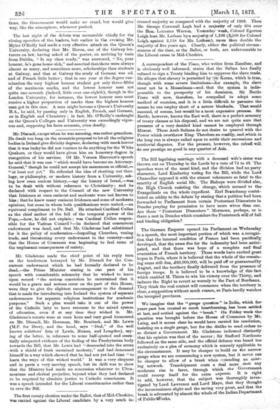Mr. Gladstone made the chief point of his reply, turn
on the tenderness betrayed by Mr. Disraeli for the Con- current endowment which he had fornially declared to be dead,—the Prime Minister stating in one pert of his speech with considerable solemnity that he wished to leave upon record " the serious conviction he entertained that it would be a grave and serious error on the part of this House, were they to give the slightest encouragement to the demand that is made for introducing into Ireland the system of separate endowments for separate religious institutions for academic purposes" Such a plan would take it out of the power of the Catholic laity to have recourse to the mixed system of education, even if at any time they wished it. Mr. Gladstone's retorts were at once keen and very good humoured on Mr. Disraeli, Mr. Horsman, Mr. Bentinck, and Mr. Lewis (M.P. for Derry, and the head, says " Dod," of• the well known solicitors' firm of Lewis, Munns, and Longden), say- ing of the latter, in reference to some half-quoted and essen- tially misquoted evidence of the feeling of the Presbyterian body towards the Bill, that Mr. Lewis had " descended into the arena .with a shield of fresh unstained modesty," and had demeaned himself-in away which showed that he had not yet had time " to learn the ways of this wicked world." It was- is very eloquent and in parts a very moving speech, but its drift was to show that the Ministry had made no concession whatever to Ultra- montane and clerical prejudice, beyond what they had declared to be required by absolute justice to Catholic consciences. It was a speech intended for the Liberal constituencies rather than to save the Bill.






































 Previous page
Previous page